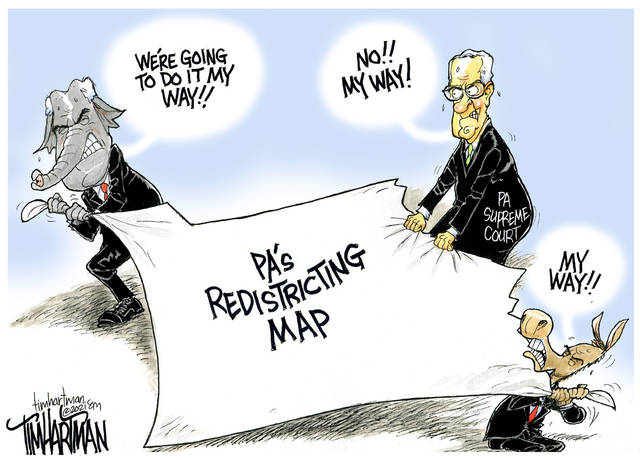It is hard to accomplish anything when two sides refuse to negotiate.
It’s true of million-dollar labor disputes and neighbors fighting about fencelines. That’s why what frequently is necessary is an mediator — a rational voice to encourage reasonable debate over a rehashing of all the disagreements.
For a courtroom, that’s the judge. In a contract negotiation, it might be a mediator.
And for the redistricting of Pennsylvania, it will be Mark Nordenberg.
On Monday, the Pennsylvania Supreme Court named the chancellor emeritus of University of Pittsburgh to chair the Legislative Reapportionment Commission. Nordenberg will serve as the pivot point between the Republican majority leadership — Sen. Kim Ward of Hempfield and Rep. Kerry Benninghoff of Centre County — and their Democratic minority counterparts, Sen. Jay Costa of Forest Hills and Rep. Joanna McClinton of Philadelphia.
The five-person structure of the commission is meant to provide balance, but carries the danger of creating a bloc that would ensure one side or the other “wins” in the quest to adjust the lines and borders of the state’s legislative districts.
This is a process where the winners shouldn’t be one political party or another. They should be the people of Pennsylvania who are adequately represented rather than jammed into the unnatural shapes of gerrymandering that lets one side exert control.
Nordenberg is a Democrat, but he also is a centrist who has professed “genuine respect for and good feelings toward” legislators of both red and blue stripes. He’s also a universally respected figure, recognized for his intellect and leadership ability, and appreciated for his even-keeled temperament.
“I think that fair elections are essential to democracy, and fair district lines are essential to fair elections,” Nordenberg said.
That one statement is the essence of why the lines have to be reassessed and nudged every 10 years after the U.S. census. Accurate representation in Pennsylvania is important not just to who sits in Harrisburg or who stands up for the state in Washington. It matters to the whole country because of Pennsylvania’s role as a swing state in every presidential election.
The other four members of the commission have already proved themselves intractable. Their inability to pick a chairman on their own is why the state Supreme Court had to do the job for them. It is the fifth time in 60 years that has happened, which might not sound bad if it weren’t for the fact that the commission only happens once a decade.
So now Nordenberg must represent not one party or position but a neutral rationality in a state run by partisanship.
“The citizens of Pennsylvania are counting on him to navigate the challenging process in his role as chairman of the commission,” Ward said. The former Pitt chancellor is clearly up to the task — and it’s up to all the legislators to do what’s best for the state.








